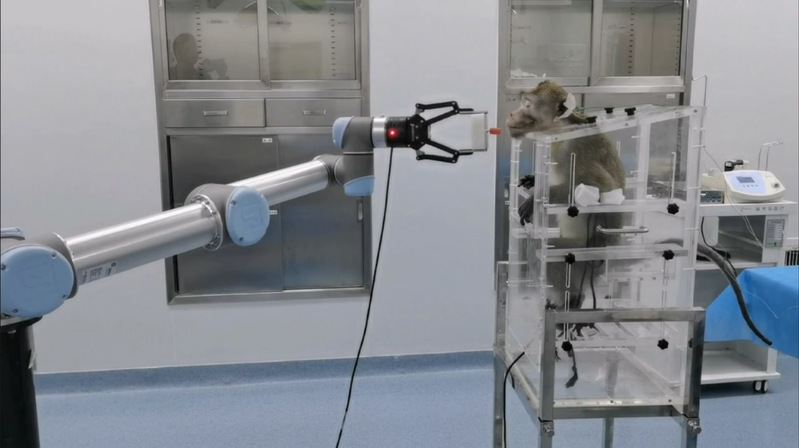The World’s First Interventional Brain Machine Interface Experiment Led by NKU Team on Non-Human Primates
The world's first Interventional Brain Machine Interface experiment on non-human primates was successfully carried out in Beijing on May 4, 2023. The experiment enabled brain control of a robotic arm through an Interventional Brain Machine Interface implanted in a monkey's brain, which marks the world-leading status of China’s brain machine interface technology.

Figure 1. The surgical trial of an Interventional Brain Machine Interface implanted on a non-human primate.

Figure 2. The experiment achieves the control of a robotic arm by a monkey through the implanted Interventional Brain Machine Interface.
The experiment was led by the team of Professor Duan Feng of Nankai University and co-conducted by the 301 Hospital and Shanghai HeartCare Medical Technology Co., Ltd. It is a further result obtained based on previous Interventional Brain Machine Interface experiments conducted on sheep. The experiment achieved a technological leap, upgrading passive collection of interventional brain-wave signals to their active control. It also made a ground-breaking progress of brain-wave signal collection in blood vessel, interventional brain-wave signal recognition and other core technologies.

Figure 3. Professor Duan Feng (fourth from right) and his team members
The brain machine interface technology can transform brain-wave signals into controlling instructions in order to help patients with motor dysfunction (e.g. patients with stroke or ALS) to interact with outside devices and improve their living quality. During the research it was found that Invasive Brain Machine Interface causes large wounds while the Non-invasive Brain Machine Interface are vulnerable to brain volume conduction effects with poor long-term stability of brain-wave signals. However, the Interventional Brain Machine Interface developed by the team led by Professor Duan can collect brain electric signals without the need of craniotomy. It ensures safety and recognition stability compared to traditional intrusive and non-intrusive ones.
The intervention operation of the experiment was performed by the team led by doctor Wu Dongdong of the 301 Hospital First Medical Center. The intrusive brainwave sensor needs to go through the monkey’s jugular and mid-posterior and reach to the motor cortex. The postoperative intrusive brainwave signal of the non-human primate was successfully collected and recognized and the active control of the robotic arm by the animal was achieved.
The result of the Interventional Brain Machine Interface experiment on non-human primates promotes the interface taking a step forward to clinical applications from prospective studies, helps to support the upgrading of domestic medical companies and build a national brand of high-end medical device with medical and engineering cooperation and it has a broad market prospect of rehabilitation of brain disease, according to Professor Duan Feng.
(Edited and translated by Nankai News Team.)









